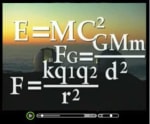Creation Vs. Evolution
Creation vs. Evolution - Part 2. (Read Part 1 First!)
Creation vs. Evolution - A Question of Origins
The creation vs. evolution debate is a question of origins. How did we get here? Were we created or did we evolve randomly? Are we the product of purposeful intelligence or are we merely the end result of countless cosmic accidents? What does the evidence say?
Creation vs. Evolution - What Are We Looking For?
Without hard evidence, the creation vs. evolution debate wouldn't amount to much more than a philosophical grudge match. Everyone has their own opinion. The question is what is the basis for that opinion? You see, people can believe whatever they want, but that doesn't make them right. It's the hard evidence that separates the proverbial wheat from the chaff. Keep in mind that "evidence" is not the same as "proof". Evidence is helpful in forming conclusions, while proof concludes the matter altogether. If we had proof, the theory of evolution wouldn't be called a theory. So what constitutes evidence? What are we looking for?
Creation denotes the existence of a divine Creator who has exercised His creative abilities, creating this world and the life-forms we see. Life is the product of intelligent contrivance. Thus, apparent design in biology would constitute evidence for a Designer. It is a self-evident and universally recognized truth: concept and design require an intelligent designer. So, while recognizing design in biology is not based upon religious premise (but upon empirical observation and logic), it certainly has theological implications [1]. Do we find apparent design in biology? Yes. In fact, apparent design pervades the biologic realm [2, 3]. When we apply the general principles of detecting design to living creatures, we find it reasonable to infer the existence of a Creator.
Evolution stresses the naturalistic (random, undirected) descent of all living creatures from a common ancestor [4] who originally evolved from inorganic matter. Life is the product of random chance. What we need here is a plausible mechanism, feasibility, and a history of functionality. British naturalist Charles Darwin (1809-1882) gave the evolutionary worldview scientific credence by supplying the much needed mechanism - "natural selection". That was 150 years ago. Today, we know that mechanism to be deficient, even in light of genetic mutation. With the tremendous advances we've made in molecular biology, biochemistry and genetics over the past fifty years we've been exposed to a whole new dimension in living systems that was previously unknown. Evolutionary biologists are now looking for a new mechanism, one that can overcome genetic constraints and other chemical-oriented barriers that have been identified in recent years. Until this mechanism is found, the theory of evolution (a theory which has enjoyed prominence in biological circles for over 100 years) simply lacks feasibility, and thus, credibility.
Creation vs. Evolution - Reason vs. Religion
The popular media often portrays the creation vs. evolution debate as science vs. religion, with creation being religious and evolution being scientific. In an ironic twist, it's the creationists who have a solid empirical basis for their theory, while the evolutionists are left clinging to their convictions by faith.
Is it reasonable to acknowledge a Creator? When challenged by skeptics to prove the existence of a Creator scientifically, Dr. Wernher von Braun, the "Father of the American Rocket and Space Program," replied, "Must we really light a candle to see the Sun? …The electron is materially inconceivable, and yet it is so perfectly known through its effects that we use it to illuminate our cities, guide our airliners through the night skies and take the most accurate measurements. What strange rationale makes some physicists accept the inconceivable electron as real, while refusing to accept the reality of a Designer on the ground that they cannot conceive of Him? …The inconceivability of some ultimate issue (which always will lie outside scientific resolution) should not be allowed to rule out any theory that explains the interrelationship of observed data and is useful for prediction." [5] To simply dismiss the concept of a Creator as being unscientific is to "violate the very objectivity of science itself." [5] While we may not be able to comprehend knowledge of a Creator, we certainly can apprehend it.


